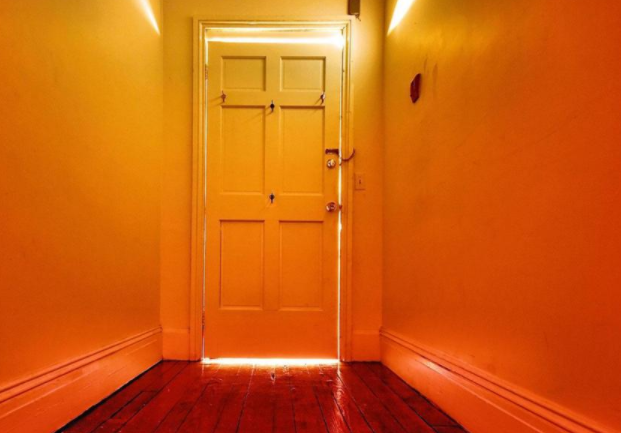You get up to grab your phone, or a cup of tea, or something else, in the other room,
but once you're there, you have absolutely no idea why.
Were you distracted? Sure, maybe.
But it could also be because you walked through a doorway.
Yup. According to psychologists at the University of Notre Dame,
They found this out by testing undergrads in the lab.
They asked students to place six blocks of various shapes and colors in a shoebox,
cover it with a lid, and then carry the box across one big room, or into another room.
There, the students were quizzed about the contents of their boxes.
but when participants had walked through doorways, their performance was consistently worse.
Something about doorways seemed to make them forget.
and even when people are asked simply to imagine crossing a threshold.
It's called the location updating effect, or more simply, the doorway effect.
You might think this is just a case of context.
Like, if you walk back into the original room, maybe that can help you remember.
But the Notre Dame scientists tested this, and that didn't make participants any less forgetful.
The forgetting wasn't just about being in a different room.
The act of walking through the doorway was the culprit.
穿過(guò)門廊才是罪魁禍?zhǔn)住?/div>
So what's going on?
什么原因呢?
The best explanation has to do with how our brains process events.
最佳解釋是因?yàn)檫@與我們的大腦處理事件的方式有關(guān)。
After all, you can only think about so many things at once.
畢竟,你一次只能想這么多事情。
Working memory, our neural representation of what's currently happening, is limited.
工作記憶,即我們對(duì)當(dāng)前正在發(fā)生事情的神經(jīng)表征,是有限的。
So the best way for our brains to deal with everything is to break it into chunks.
所以大腦處理一切事情的最好方法就是把記憶分成幾塊。
According to this theory—known as the Event Segmentation Theory—
根據(jù)事件分割理論,
our brains create representations of events called event models,
大腦創(chuàng)造了稱為事件模型的事件表征,
which let us predict what might come next at any given moment.
通過(guò)事件表征,我們可以預(yù)測(cè)接下來(lái)任意時(shí)刻發(fā)生的事情。
Like, if you see someone tie one shoe,
比如,如果你看到有人系一只鞋,

it's a pretty safe bet that the next thing they're going to do is tie the other one.
可以肯定的是,他們接下來(lái)要系另一個(gè)。
But these event models need to be updated, as the circumstances around you change.
但是這些事件模型需隨著周圍環(huán)境的變化而更新。
Once someone's done tying their shoes, for example, having that model in your head isn't very useful.
例如,一旦有人系好了鞋帶,頭腦中這個(gè)模型的作用就不大了。
That's where doorways—and other so-called event boundaries—come in.
門廊以及其它所謂的活動(dòng)邊界就是在這種情況下起作用的。
Doorways are a sign that something's changed, and maybe you need to refresh.
門廊是某些東西改變的標(biāo)志,也許你需要刷新一下?tīng)顟B(tài)。
The problem is that when your brain updates this status report, that old information isn't as accessible—
問(wèn)題是當(dāng)你的大腦更新?tīng)顟B(tài)時(shí),舊的信息就不那么容易獲取了——
even if you still need it.
即使你仍然需要這些舊的信息。
Psychologists also think people might have a hard time remembering things—
心理學(xué)家還認(rèn)為,人們有的時(shí)候可能很難記住事物——
like those colored blocks in the experiments—
就像測(cè)試?yán)镏械牟噬綁K一樣——
because they create two event models with those objects, one for each room.
因?yàn)榇竽X用這些彩色方塊創(chuàng)建了兩個(gè)事件模型,每個(gè)房間一個(gè)。
So, when it comes time to retrieve the information about what's in the box,
所以,當(dāng)需要檢索盒子里的信息時(shí),
or what you went into the other room to find,
或者你走進(jìn)另一個(gè)房間去找東西,
the two models compete and interfere with each other.
這兩個(gè)模型相互競(jìng)爭(zhēng),相互干擾,
But this whole system that your brain has for processing things still is useful—
但是大腦處理事情的整個(gè)系統(tǒng)仍然有用,
even if it sometimes leaves you in the kitchen, wondering why you're there.
即使大腦記憶有時(shí)會(huì)留在廚房,想知道為什么嗎?
That's because, more often than not, passing through a door does mean that a new event is beginning,
那是因?yàn)椋ǔ#簧乳T意味著一個(gè)新的開(kāi)始,
which means that it's okay to dump all the information about the old event.
這意味著所有關(guān)于舊事件的信息可以傾倒。
So this kind of forgetting might be annoying, but isn't really a bad thing.
所以這種遺忘可能很煩人,但也不是一件壞事。
And it's not a sign that you're getting old or developing dementia.
這并不表明你變老或患上癡呆癥。
Scientists actually checked this, and the doorway effect was just as strong in college students as it was in a group of older people.
大學(xué)生的門廊效應(yīng)和老年人的一樣強(qiáng),這已經(jīng)過(guò)科學(xué)家們驗(yàn)證,
In fact, event boundaries like doorways sometimes might even help you remember.
事實(shí)上,門廊邊界有時(shí)甚至可以幫助你記憶。
In a different experiment, the same Notre Dame psychologists challenged students to remember a list of words that was read aloud,
在另一項(xiàng)實(shí)驗(yàn)中,圣母大學(xué)的心理學(xué)家讓學(xué)生們記住大聲朗讀的單詞列表,
half in one spot, and the other half in another room, or the same distance away within the same room.
一半單詞列表在一個(gè)地方,另一半在另一個(gè)房間,或者同一個(gè)房間里相同距離的地方。
The test subjects remembered more of the words when they crossed through a doorway than when they just moved to another part of the room.
受試者穿過(guò)門廊記住的單詞比他們?nèi)サ搅硪粋€(gè)房間記住的單詞要多。
Here, the doorway was beneficial: by divvying up the words in two separate event models,
在這個(gè)實(shí)驗(yàn)中,門廊是有益的:將單詞分配在兩個(gè)獨(dú)立的事件模型中,
the brain can structure the information better, and take more of it in.
大腦可以更好地組織并吸收更多信息。
So, if you end up in your kitchen baffled by why you're there, don't worry.
所以,如果你在廚房里對(duì)你為什么在那里感到困惑,不要擔(dān)心。
Your brain made a tiny mistake.
你的大腦犯了個(gè)小錯(cuò)。
In the grand scheme of things, it's doing things just right.
從大局來(lái)看,大腦的處理是正確的。
Thanks for watching this episode of SciShow Psych, brought to you by our super kind patrons on Patreon.
感謝收看本集心理科學(xué)秀,感謝Patreon對(duì)本節(jié)目的大力支持。
If you want to help support this show, go to patreon.com/scishow.
如果你想幫助支持這個(gè)節(jié)目,請(qǐng)?jiān)L問(wèn)patreon.com/scishow。
If you liked this video, give it a thumbs up, and if you want to learn more with us, hit subscribe!
如果你喜歡這個(gè)視頻,請(qǐng)給我們點(diǎn)贊,如果你想學(xué)習(xí)更多,請(qǐng)點(diǎn)擊訂閱我們的節(jié)目!


